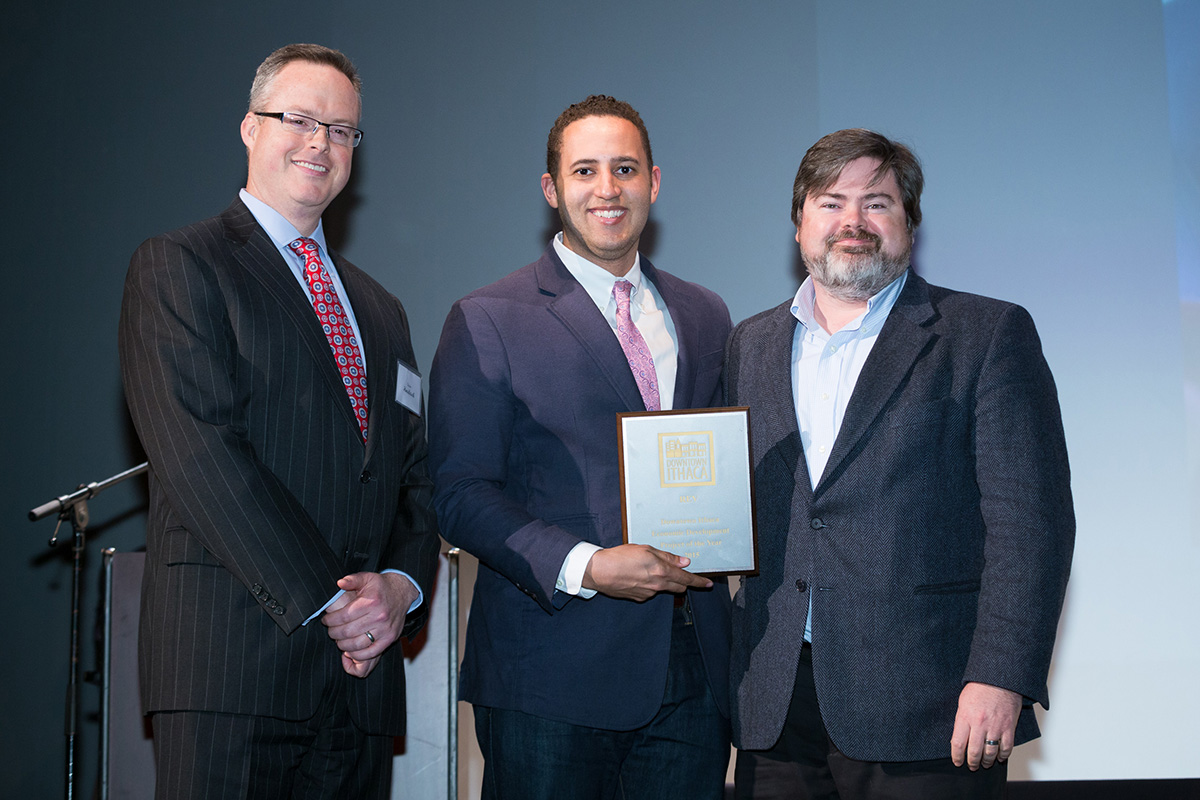Sparking Ithaca's startup economy, Rev wins award
By Susan Kelley

Since it opened in September 2014, Rev: Ithaca Startup Works has helped nearly 40 startups navigate the complex challenges of being a young company by providing mentorship and office space, serving as an incubator during that crucial early period of growth.
A project of Cornell’s Center for Regional Economic Advancement (CREA), Rev also embodies Cornell’s commitment to create jobs and support entrepreneurship that benefits Ithaca, Tompkins County and the rest of New York.
For this work, Rev received the Economic Development Project of the Year award March 14 from the Downtown Ithaca Alliance (DIA), a business development nonprofit. Tom Schryver ’93, MBA ’02, executive director of CREA, accepted the award.
“Each year we recognize a significant project with long-term implications that really contributed to the vitality of downtown. Rev covers all those bases,” said Gary Ferguson, DIA executive director. “It has helped people regard downtown as a place where entrepreneurship happens. It provides a platform that we never had before.”
Ithaca did have a startup community prior to Rev, which is a partnership among Cornell, Ithaca College and Tompkins Cortland Community College. But the entrepreneurial community lacked a central location, said Schryver. With office space just paces from the Ithaca Commons at 314 State St. and frequent entrepreneurship programming, Rev facilitates serendipitous interactions where entrepreneurs can talk shop about common challenges and recommend, say, a software developer or a fix for a branding problem, Schryver said. Those interactions continue when they walk out Rev’s door.
“The fact that we’re right downtown, a stone’s throw from the lawyers and the graphic designers and the accountants and the small businesses that entrepreneurs draw upon, means we are rooting ourselves in this community. By choosing to do that, it does create this startup economy downtown,” Schryver said. Two Rev startups have outgrown the Rev office and are renting their own spaces on or within a block of the Ithaca Commons. A third will soon follow.
Rev members range from food companies such as Ithaca Hummus, founded by Chris Kirby ’15, to high-tech startups such as Ursa Space Systems, a geospatial services company founded by Adam Maher ’06, M.Eng. ’07, who transferred the company to Ithaca from Silicon Valley.
Startups pay $200 monthly per person to become a Rev member. That buys them entry to Rev events, 24-hour access to the offices, a prototyping lab, Wi-Fi, personal lockers, a mailing address, tax benefits, and free printing, scanning and coffee. A less expensive virtual membership costs $100 per month with access to the offices for $10 a day.
More crucially, membership also includes mentoring from Rev’s entrepreneurs-in-residence. Startup founders often say their biggest challenge is a lack of funding to fuel their business, Schryver said. In fact, frequently the underlying cause is they haven’t solved fundamental business-model problems – which is where Rev comes in. “The main thing we do is help people get unstuck,” Schryver said.
Many on the Rev team teach entrepreneurship and related topics at Cornell or Ithaca College. For example, Schryver, who leads the Entrepreneurship and Innovation Institute at the Samuel Curtis Johnson Graduate School of Management, teaches entrepreneurship and business strategy. Brad Treat, MBA ’02, teaches practical entrepreneurship at Ithaca College and Cornell and has served as the entrepreneur-in-residence at Cornell. And Ken Rother, Rev’s Hardware Accelerator program director, will run a program this summer aimed at helping entrepreneurs create businesses centered on physical products; he’s also piloting a course on that topic at Johnson and will bring the class to Rev to use its prototyping lab as part of the class.
That’s a good example of the synergy Rev sparks between Cornell and Ithaca’s startup ecosystem. “We’re a group of people who are building up a competency around helping people start and grow businesses,” Schryver said. “We can apply that competency on campus, in the community, around the region. It’s all the same songbook.”
Media Contact
Get Cornell news delivered right to your inbox.
Subscribe